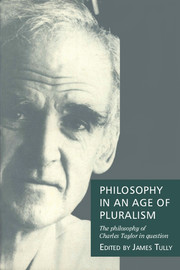Book contents
- Frontmatter
- Contents
- Notes on the contributors
- Preface
- Acknowledgements
- Introduction
- Part I Foundations
- Part II Interpreting modernity
- 3 Modernity and disenchantment: some historical reflections
- 4 Religion, history and moral discourse
- 5 The risks and responsibilities of affirming ordinary life
- Part III Natural and human sciences
- Part IV Philosophy in practice
- Part V Ethics, politics and pluralism
- Part VI Reply and re-articulation
- Bibliography of the works of Charles Taylor
- Index
4 - Religion, history and moral discourse
Published online by Cambridge University Press: 05 June 2012
- Frontmatter
- Contents
- Notes on the contributors
- Preface
- Acknowledgements
- Introduction
- Part I Foundations
- Part II Interpreting modernity
- 3 Modernity and disenchantment: some historical reflections
- 4 Religion, history and moral discourse
- 5 The risks and responsibilities of affirming ordinary life
- Part III Natural and human sciences
- Part IV Philosophy in practice
- Part V Ethics, politics and pluralism
- Part VI Reply and re-articulation
- Bibliography of the works of Charles Taylor
- Index
Summary
It is a commonplace that in Western society and culture, during the past three centuries, the grip of religious traditions and beliefs has weakened. Ritual life has changed in content and scope, and its hold on people's lives has become more restricted and less vigorous. Belief in God, in divine Providence, and such matters is no longer taken for granted by the majority; religious commitment is more selective, vaguer, and without the old robustness. Religious behaviour and beliefs affect people less than they once did. At least they matter differently, in more qualified ways, and without the old sense of depth and stability. The roles of religion and its primacy in everyday life and in our intellectual world are not what they once were.
The precise and detailed story of the erosion of the religious dimension of Western culture, however, is not a simple one. It is not an uncomplicated and linear story of unmitigated decline without any evidence of permanence or recovery. Nor is it a single story. Religious life and belief changed in France earlier than in Germany and in different ways. And they changed later still in England and America, and there, too, differently. But, if Charles Taylor is right, the complexity of these narratives converges on a common conclusion, that the modern identity, our self-understanding as moral agents, cannot be properly comprehended without reference to its religious history.
- Type
- Chapter
- Information
- Philosophy in an Age of PluralismThe Philosophy of Charles Taylor in Question, pp. 49 - 66Publisher: Cambridge University PressPrint publication year: 1994
- 4
- Cited by



